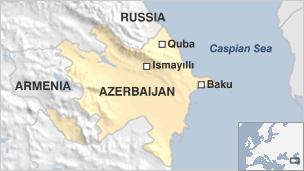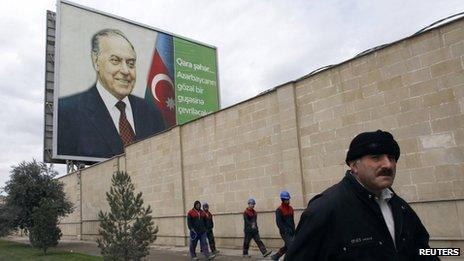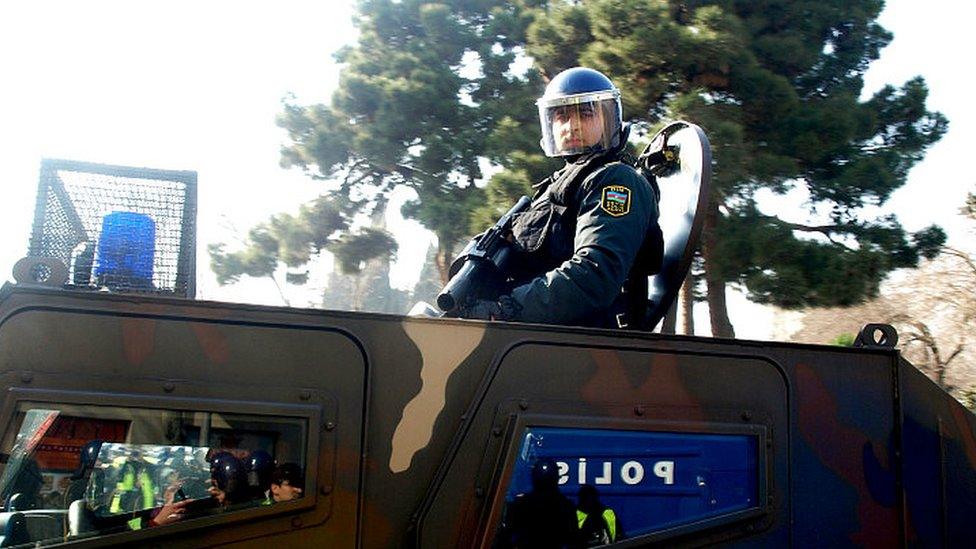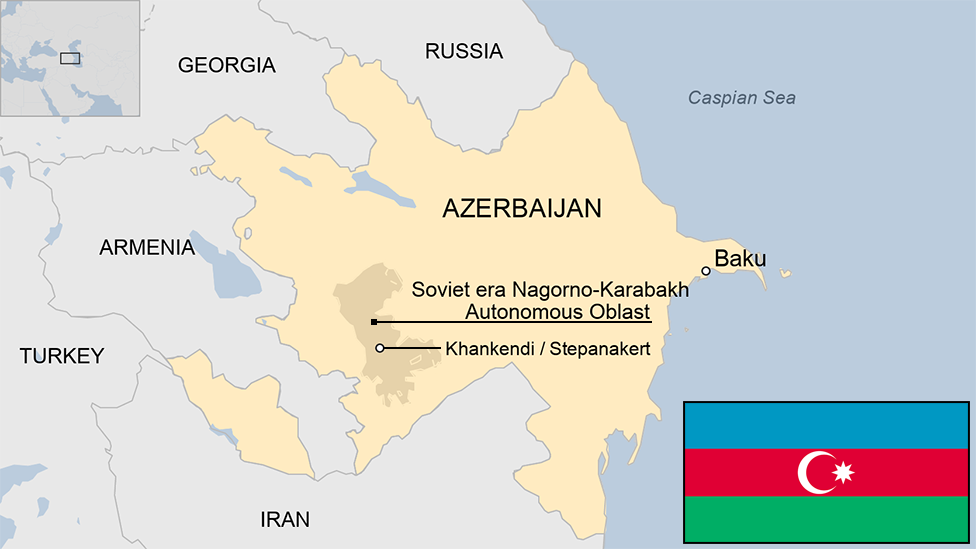Azerbaijan's Ilham Aliyev claims election victory
- Published
Ilham Aliyev has been president of Azerbaijan since 2003.
Azerbaijan's leader Ilham Aliyev has claimed victory in presidential polls, thanking the Azeri people for electing him to a third term.
With about three-quarters of the votes counted Mr Aliyev had won nearly 85%, the national election commission said.
The president called the election a "triumph of democracy", but opposition groups alleged widespread fraud.
Mr Aliyev inherited the presidency from his father in 2003. He has stifled dissent and scrapped term limits.
So confident was he of victory on Wednesday, he did not run a campaign.
"Azerbaijan will continue successfully to develop as a democratic country," Mr Aliyev said in a pre-recorded TV address. "The fact that this election was free and transparent is another serious step towards democracy."
Human rights groups say in the run-up to the elections the government launched an unprecedented crackdown on its critics.
But political opposition in the country of nine million has also been blunted by prosperity, with oil wealth more than tripling gross domestic product.
'Apathy and fear'
With 75% of the votes counted, the share for the main opposition candidate, Jamil Hasanli, stood at just 5.2%, the election commission said.
Mr Hasanli, a 61-year-old history professor, represents a coalition of parties.
He told reporters earlier in the day that his campaign had witnessed "cases of ballot stuffing at a number of polling stations".
"Regrettably, many government officials are involved in falsification, becoming accomplices of a grave crime,'' he was quoted as saying.
Opposition activists circulated photos and videos appearing to show individuals casting multiple ballots - though these could not be verified.
Other challengers included five MPs and two low-profile opposition figures. Critics say some are in collusion with the government and only in the race to dilute the opposition vote.
Mr Aliyev, who enjoys immense power after inheriting the presidency from his father in 2003, abolished a two-term presidential limit in a controversial referendum in 2009.

International monitors said the pre-election atmosphere was characterised by a combination of apathy and fear.
A recent Human Rights Watch report, external said that in the last year the government had intensified its crackdown on civil society and passed a number of laws to curtail any form of dissent, including a $10,000 (£6,000) fine for organising or attending an unsanctioned rally.
One rights group said that the number of political prisoners had doubled in advance of the elections.
Opposition figures were starved of any publicity on national TV channels.
However, many Azerbaijanis do support the president, often citing the increase in living standards.
One voter, Iskander Kerimov, said: "I voted for the president, because he is the person who secured stability in the republic during the past 10 years of his rule, and we saw clear results of his activity.
"I think he will be working hard in the future as well for the sake of the country, for the sake of stability, peace and prosperity."
In the decade since Mr Aliyev succeeded his father, Azerbaijan has been through an economic boom.
Even so, dissent has grown over what critics describe as the country's endemic corruption and a large divide between rich and poor.

Azerbaijan's late President Heydar Aliyev died in 2003, paving the way for his son to inherit his powers
Azerbaijan is an important supplier of oil and natural gas for European markets.
The president has courted Western states attracted by its strategic location and status as a producer and transporter of oil and gas.
Oil multinationals BP, ExxonMobil and other Western companies have invested billions of dollars to tap into Azerbaijan's oil riches.
An oil pipeline supported by the US and the European Union to pump Azerbaijani crude oil via Georgia to Turkey - bypassing Russia - went into operation in 2005.
The pipeline is seen as an important part of the West's aim of reducing Europe's dependence on Russian energy resources.
- Published3 May 2013

- Published12 April 2013

- Published5 March 2013

- Published13 February 2024
